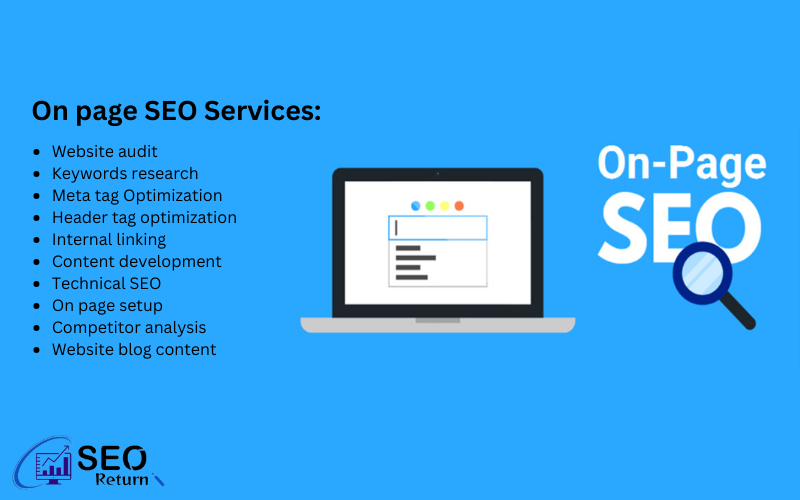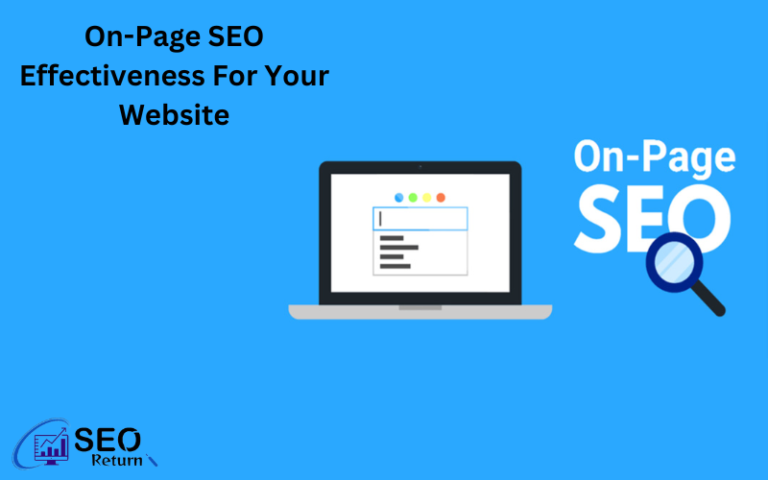On-Page SEO:
On-page SEO (also called on-site SEO) is the method of optimizing web pages and their content for both search engines and users. It can help order pages higher on Google and drive more organic traffic. Common tasks associated with this are search intent, title tags, internal links, and URLs.
It is a process of fine-tuning a page’s content, tags, and inner links to perk up search visibility and increase traffic. It’s a means of optimizing your website to help search engines better recognize your website. It comes with a whole congregation of benefits.
The first five organic outcomes on an explore page get 67.60% of all ticks. The next five account for 3.73%. And it plunges from there. So, if you want to get traffic, you need to be near the top.
Secondly, high-ranking sites have a much-improved click-through rate. The first Google mobile search outcome has an average CTR (click-through rate) of 26.9%.
Now believe that 92.4% of internet users who search on their mobile phones for something nearby visit that business the same day and you can start to see the collision of natural SEO can have on your bottom line. And on-page optimization is an important factor in your organic ranking.
Why On-Page SEO Matters:
On-page SEO is vital because it swings how Google and other search engines construe the content on your page. Your goal is to ensure that your content is fully optimized for your chosen keywords so that the search engine is optimistic to rank you higher.
On page SEO Services:
Content is king basically, SEO without content is like a beautiful car without an engine it looks nice but cannot go anywhere. Google weights your site based on E-A-T, (Expertise, authoritativeness, and trustworthiness. Search engines will grade highly optimized content higher on search engine pages than non-optimized content. Content is very important, you can’t be visible to search engines. Content signals to search engines like Google that you are worth recommending, permits you to get in the face of your target spectators and offers you marvellous chances to grow your business.
Keywords:
The most basic way to tell your website’s content answers a user’s question is the language you use. Pages that feature the keywords used in the query, whether in the body, heading, or both are more likely to be relevant to the search.
Sometimes this is easy to determine. If you are searching the website of a furniture store, you are probably going to desire to contain keywords like sofa, dining room set, and end table.
It is a particular furniture store; you will wish to make sure you are including long-tail keywords like modern art-deco sideboards.
In short, you want to know what your goal clients are searching for and create content that contains these terms. It’s always a good idea to do research, so you are not missing any chance.
It is largely divided into 3 categories content, HTML, and website architecture
- Website audit
- Keywords research
- Meta tag Optimization
- Header tag optimization
- Internal linking
- Content development
- Technical SEO
- On page setup
- Competitor analysis
- Website blog content

Best On-page SEO Tools:
Following are the On-page SEO tools
Google PageSpeed Insights:
Enter a URL; these tools will trial the loading time and performance for that URL on desktop and mobile. It then ranks your site’s appearance from 0-100. It tells you exactly how fast it takes to load a site according to different metrics and suggests a development area.
Ahrefs Webmaster Tools:
Run a technical audit of your site. Sign up for Ahrefs Webmaster Tools, verify your website, and you can audit your website for over 100 technical SEO matters. After running an audit it also suggests areas where you can improve your internal linking, which helps boost your rankings in search engines.
Public answer:
Enter any relevant keyword, and Answer the Public will provide a huge list of long-tail keyword opportunities, plus common questions asked.
Google Analytics:
The most commanding at no-cost analytics tool offered, Google Analytics tracks pretty much every bit of traffic you can imagine on your website where it approaches from, and which page is getting. While it is not for SEO purely, it’s still a helpful tool to track if you are getting traffic from organic searches.
Google Search Console:
Google Search Console bestow you a feel of what the majority of used search engines imagine of your website. You can use it to check and fix technical issues on your website, see important data like clicks, impressions, and average ranking position, submit sitemaps, and more.
Ahrefs’ Backlink Checker:
The free version of Ahrefs Back Link Checker shows the top 100 backlinks to a website or URL, along with the total number of backlinks and referring domains. An immense method to use this device is to paste your opponent’s website and find possible link-building opportunities.
Google Ads Keyword Planner:
Enter a keyword or group of keywords into the tool, and Google keyword planner will return all sorts of helpful stats to guide your keyword strategy, monthly search volume, competition, and still optional terms you should not have measured.
SERP Snippet Optimization Tool:
Look how your meta title and description appear in the search results before you even publish your web page.
Google Trends:
Google’s tendency to demonstrate the popular explore terms over time, is helpful for the discovery of seasonal differences in search reputation. evaluate multiple terms to see their relative popularity over time, and observe useful keyword propositions.
Yoast SEO:
Go into the main keyword for your blog position, and Yoast SEO will propose how to pinch it to optimize for search engines. You can as well get suggestions for general SEO upgrading for content like Meta tags and URL strikes. It was mainly available to WordPress users.
SERP Robot:
Go into some website or web page and up to five keywords to see where you grade for each of them. Check your contestant and ranking too.
XML Sitemaps:
Effortlessly enter your site’s URL and a few optional strictures, and XML Sitemaps will make a sitemap that you can upload to Google Search Console and Bing Webmaster Tools.
Robots txt Generator:
Reboot text files to let web robots know what to do with website pages. When a page is disallowed in robots. txt, which represents instruction telling the robots to skip over those web pages completely.
Google Alerts:
Come in your brand, company or name and Google will send you an email if it finds any webpage states those terms.





